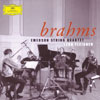Brahms String Quartets Op 51 & Op 67; Piano Quintet Op 34
Thirty years together: where do they find the freshness, vigour and pleasure?
View record and artist detailsRecord and Artist Details
Composer or Director: Johannes Brahms
Genre:
Chamber
Label: Deutsche Grammophon
Magazine Review Date: 9/2007
Media Format: CD or Download
Media Runtime: 142
Mastering:
Stereo
DDD
Catalogue Number: 477 6458

Tracks:
| Composition | Artist Credit |
|---|---|
| String Quartet No. 1 |
Johannes Brahms, Composer
Emerson Qt Johannes Brahms, Composer |
| String Quartet No. 2 |
Johannes Brahms, Composer
Emerson Qt Johannes Brahms, Composer |
| String Quartet No. 3 |
Johannes Brahms, Composer
Emerson Qt Johannes Brahms, Composer |
| Quintet for Piano and Strings |
Johannes Brahms, Composer
Emerson Qt Johannes Brahms, Composer Leon Fleisher, Piano |
Author: Harriet Smith
The Emerson Quartet celebrate their 30th anniversary with the three Brahms quartets plus the Piano Quintet. For an ensemble who have been together longer than most marriages, they still sound remarkably fresh, vigorous and pleased with life. Technical finesse has always been a given with this group, and as ever their playing has a sureness and ease that leaves most ensembles behind. Their reading of the ebullient Third Quartet is particularly fine, with the leader imbuing the ravishing second-movement melody with teasing little portamenti. And in the finale, lyricism is combined with an infectious élan.
What comes across most strongly in these performances is the very different nature of each quartet. The urgency of the First belies its long gestation. Textures are kept crisp and even the densest passages never become clogged. It’s a work where the viola in particular gets to shine, and Lawrence Dutton enjoys the limelight. The Belcea Quartet are more euphonious, more sleek, but I find the Emerson ultimately more compelling. The Alban Berg Quartet perhaps convey the edgy changeability of the Second Quartet more naturally, but overall this new version remains an impressive achievement.
For the Piano Quintet, the Emerson are joined by Leon Fleisher, who continues his rehabilitated two-hand career with a strongly etched performance of this concerto-like work. Once again there is much to impress here, from the slow and sensitive piano introduction to the precision of the string playing in the third movement. But turn to Pollini and the Quartetto Italiano in their classic account and the picture changes. The Emerson’s interpretation is warmer, cosier almost. The Italiano emphasise the outlandishness of some of Brahms’s innovations – the ghostly opening of the finale, the malevolence of the Scherzo – and their final presto outburst is close to breaking-point. If this is too uncomfortable, then you’re likely to love the Emerson; but for me, the earlier recording reigns supreme.
What comes across most strongly in these performances is the very different nature of each quartet. The urgency of the First belies its long gestation. Textures are kept crisp and even the densest passages never become clogged. It’s a work where the viola in particular gets to shine, and Lawrence Dutton enjoys the limelight. The Belcea Quartet are more euphonious, more sleek, but I find the Emerson ultimately more compelling. The Alban Berg Quartet perhaps convey the edgy changeability of the Second Quartet more naturally, but overall this new version remains an impressive achievement.
For the Piano Quintet, the Emerson are joined by Leon Fleisher, who continues his rehabilitated two-hand career with a strongly etched performance of this concerto-like work. Once again there is much to impress here, from the slow and sensitive piano introduction to the precision of the string playing in the third movement. But turn to Pollini and the Quartetto Italiano in their classic account and the picture changes. The Emerson’s interpretation is warmer, cosier almost. The Italiano emphasise the outlandishness of some of Brahms’s innovations – the ghostly opening of the finale, the malevolence of the Scherzo – and their final presto outburst is close to breaking-point. If this is too uncomfortable, then you’re likely to love the Emerson; but for me, the earlier recording reigns supreme.
Discover the world's largest classical music catalogue with Presto Music.

Gramophone Digital Club
- Digital Edition
- Digital Archive
- Reviews Database
- Full website access
From £8.75 / month
Subscribe
Gramophone Full Club
- Print Edition
- Digital Edition
- Digital Archive
- Reviews Database
- Full website access
From £11.00 / month
Subscribe
If you are a library, university or other organisation that would be interested in an institutional subscription to Gramophone please click here for further information.




